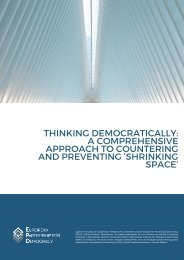Repression and resilience: Diagnosing closing space mid-pandemic
Create successful ePaper yourself
Turn your PDF publications into a flip-book with our unique Google optimized e-Paper software.
26 REPRESSION AND RESILIENCE: DIAGNOSING CLOSING SPACE MID-PANDEMIC<br />
Defenders of democratic <strong>space</strong><br />
<strong>mid</strong>-p<strong>and</strong>emic<br />
In the face of these many trends that restrict <strong>space</strong> for<br />
contestation, it is important to ask: who has actually been<br />
defending democratic <strong>space</strong> during the p<strong>and</strong>emic? And<br />
how are they keeping democratic <strong>space</strong> from <strong>closing</strong> in<br />
the face of a public health <strong>and</strong> economic crisis? While<br />
we know the state <strong>and</strong> non-state actors who’ve led the<br />
clampdown on democratic <strong>space</strong> very well, this section<br />
looks at the key actors who defended democratic <strong>space</strong><br />
in 2020, <strong>and</strong> compares the impact of the p<strong>and</strong>emic on<br />
these actors’ ability <strong>and</strong> tactics for defending democratic<br />
<strong>space</strong>.<br />
like Venezuela <strong>and</strong> El Salvador, civil society shifted their<br />
focus to service provision <strong>and</strong> the p<strong>and</strong>emic response<br />
at local level. This included efforts to increase access<br />
to safe water, sanitation <strong>and</strong> food security. Civil society<br />
stepped in for authorities in supplying key services <strong>and</strong><br />
information, particularly for those groups subjected to<br />
intersecting vulnerabilities <strong>and</strong> curtailed rights. 94 95 The<br />
collective response to the Beirut Port explosion in August<br />
2020 is an example of how the solidarity of Lebanese civil<br />
society effectively replaced government help to address<br />
a multifaceted crisis that severely affected the poor. 96<br />
Civil society <strong>and</strong> citizens<br />
Just like all other sectors in society, civil society <strong>and</strong><br />
media workers had to move their activities online <strong>and</strong><br />
adapt to the new working environment. For CSOs in<br />
areas with limited internet access or infrastructure for<br />
social distancing, this brought significant challenges<br />
<strong>and</strong> disruptions in their work. Moreover, CSOs were<br />
wary of online surveillance by law enforcement, leading<br />
to significant self-censorship. Many CSOs further<br />
experienced delays in the disbursement of funding, but<br />
most donors were flexible in adapting projects to the<br />
new reality.<br />
Despite all these obstacles, civil society proved to be<br />
adaptive <strong>and</strong> often played a crucial part in protecting<br />
vulnerable communities from the multiple impacts of<br />
COVID-19 restrictions. In countries where the p<strong>and</strong>emic<br />
brought about significant socio-economic hardships,<br />
While this provided much-needed relief, it also shifted<br />
focus away from advocacy <strong>and</strong> dem<strong>and</strong>s for political<br />
participation <strong>and</strong> reforms. Most protests in these<br />
countries similarly demonstrated against hunger, lack of<br />
access to water <strong>and</strong> healthcare, <strong>and</strong> injustices against<br />
workers. In some countries this came at the expense<br />
of democratic reform movements. In Venezuela, for<br />
instance, the new consciousness of the need for reform<br />
<strong>and</strong> momentum for democracy that was seen in January<br />
2020, gave way to a re-prioritisation of socio-economic<br />
concerns among the broader population with the onset<br />
of the p<strong>and</strong>emic. While protests on poor public service<br />
provision - particularly health, education, water, gas<br />
<strong>and</strong> electricity - continued in 2020, there were far less<br />
protests dem<strong>and</strong>ing political reform <strong>and</strong> the opposition<br />
movement lost significant momentum. As the researcher<br />
described, “the dem<strong>and</strong> for democratisation might<br />
persist, but the hopes of it taking place are now remote.”<br />
In other countries, however, the p<strong>and</strong>emic also led to<br />
94 Young, R. & Panchulidze, E. (2020): Global Democracy & COVID-19: Upgrading International Support. Available here.<br />
95 For a comprehensive list of civil society efforts during the p<strong>and</strong>emic, see: CIVICUS (2020): Solidarity in the Times of COVID-19: Civil society<br />
responses to the p<strong>and</strong>emic. Available here.<br />
96 The New Humanitarian (18 August 2020): “Local groups step up to lead Beirut blast response”. Available here.

















